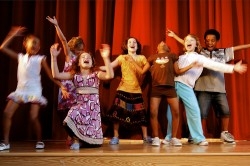By Sharon McCarry
My oldest son came home one day with an excellent idea. Little did we know how it would shape all our lives to come.
In grade four, Liam handed me an application to attend Montreal’s Mackay Centre School where he, as a typically developing child, would learn alongside physically disabled and deaf children for one year. The program is truly innovative: instead of integrating special needs children into regular classrooms, the Mackay Centre does the reverse — accepting a limited number of typically-functioning children from the English Montreal School Board into classrooms where the majority of students have special needs.
I wasn’t sure what to expect, but Liam thrived in this reverse-integration environment. The idea of community became more meaningful for him. Liam was valued for gifting empathy and kindness. That’s different from something like a charity book-drive, where students are just gifting what they no longer need. The lessons were deep and meaningful – and life-long.
In fact, the experience would come to shape Liam’s career choice. Fast-forward almost a decade and my son is now studying occupational therapy at McGill University, hoping to help those with differing disabilities. He also works at MacKay as a lifeguard and as an integration aide at a camp for children with autism.
But that’s only part of the story.
While Liam was flourishing at Mackay Centre, my younger son, Colm was showing signs of autism and would later be officially diagnosed. Autism is a neurodevelopmental disorder that is marked by impaired verbal and social communication and rigid, restrictive and repetitive behaviours, among other hallmarks.
It was difficult to find Colm the appropriate supports so he could learn and thrive too. I was driving around Montreal at least three hours a day to get him both individual therapies and some integrated socialization in a play based setting. It was stressful for both of us and we were struggling.
I knew from Liam’s experiences, there had to be a better way.
Colm needed individual coaching to acquire basic social skills and behavioural supports, but I also knew he needed opportunities to practice those skills and learn from typically developing peers. I decided that if I couldn’t find what Colm needed, I would build it.
So with lots of support from family and friends, I took over an existing cooperative preschool in west Montreal called the Little Red Playhouse. I developed a new type of preschool offering – loosely based on the Mackay Centre model – with enriched programming for all children alongside specialized behavioural therapy for children with autism.
It’s been a success. For nine years, the Little Red Playhouse has offered a 50-50 split between autistic and neurotypical preschoolers because we’ve found all the children thrive in this environment.
The autistic children benefit from the school’s early intervention strategies and early group socialization that is essential for improving their future. Meanwhile, the neurotypical children benefit from the school’s low staff-to-student ratios, extra compassion, scheduled downtime and enriched programming.
By preschool graduation, all the children are kindergarten ready.
Integration works. Don’t just take my word for it. Look at the evidence.
A meta-analysis of 45 distinct studies showed that meaningful peer interactions among autistic and neurotypical children results in significant and lasting intellectual and social benefits for kids with autism, while simultaneously benefiting typical kids as well. Moreover, these interactions were found to be more effective in natural play settings versus clinical settings.
One study incorporating neurotypical peers in the social learning of kids with autism surveyed the children afterward and found 83 per cent of neurotypical peers said they "enjoyed it very much" while 17 per cent said they "enjoyed it." Teachers reported the benefit of students helping each other, valued the promotion of tolerance and understanding and felt it could reduce bullying.
Parents in Montreal also understand the benefits of this model of integration and community building. To meet demand, we are growing. By 2019, the preschool will have a second 5,000 square foot space within an autonomous seniors’ residence retirement home where children and seniors can interact — another plus for community-building.
Suddenly my Little Red Playhouse is not so little.
Sharon McCarry is the founder and Executive Director of La Fondation Place Coco, which manages and operates the Little Red Playhouse. She is the proud mother of Liam

